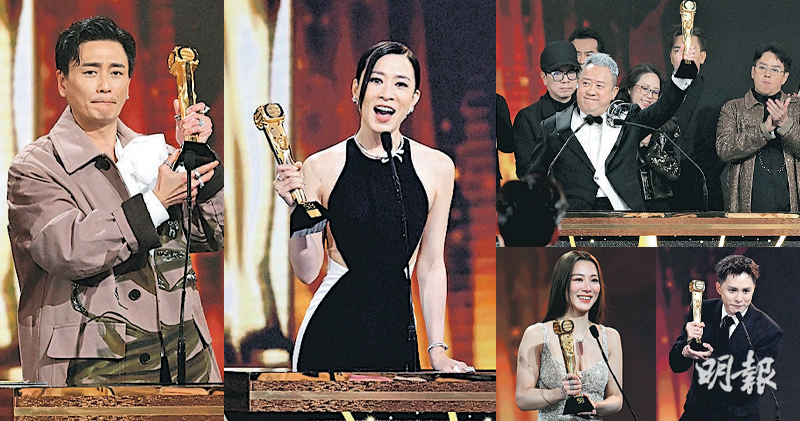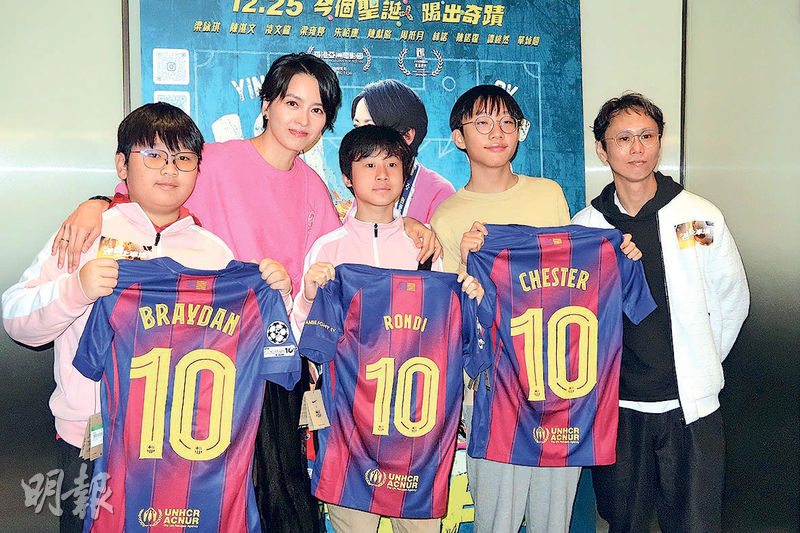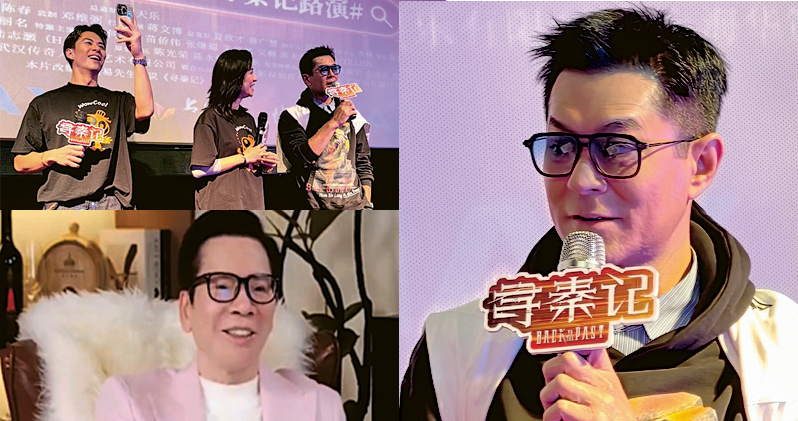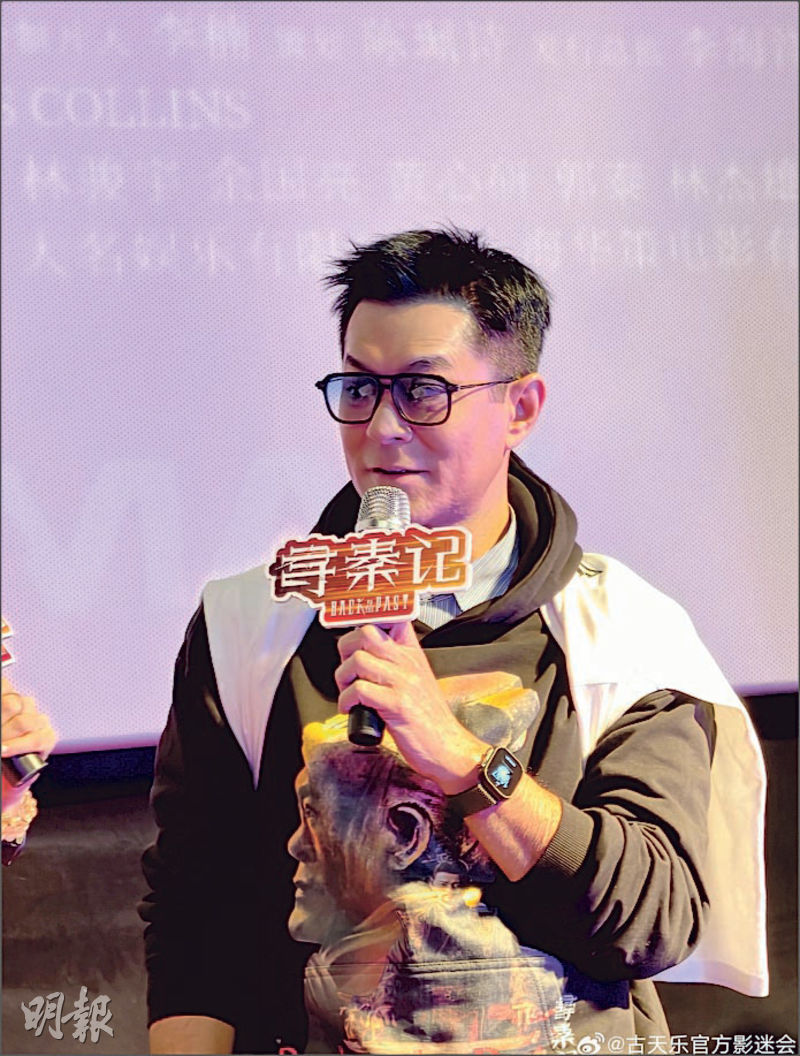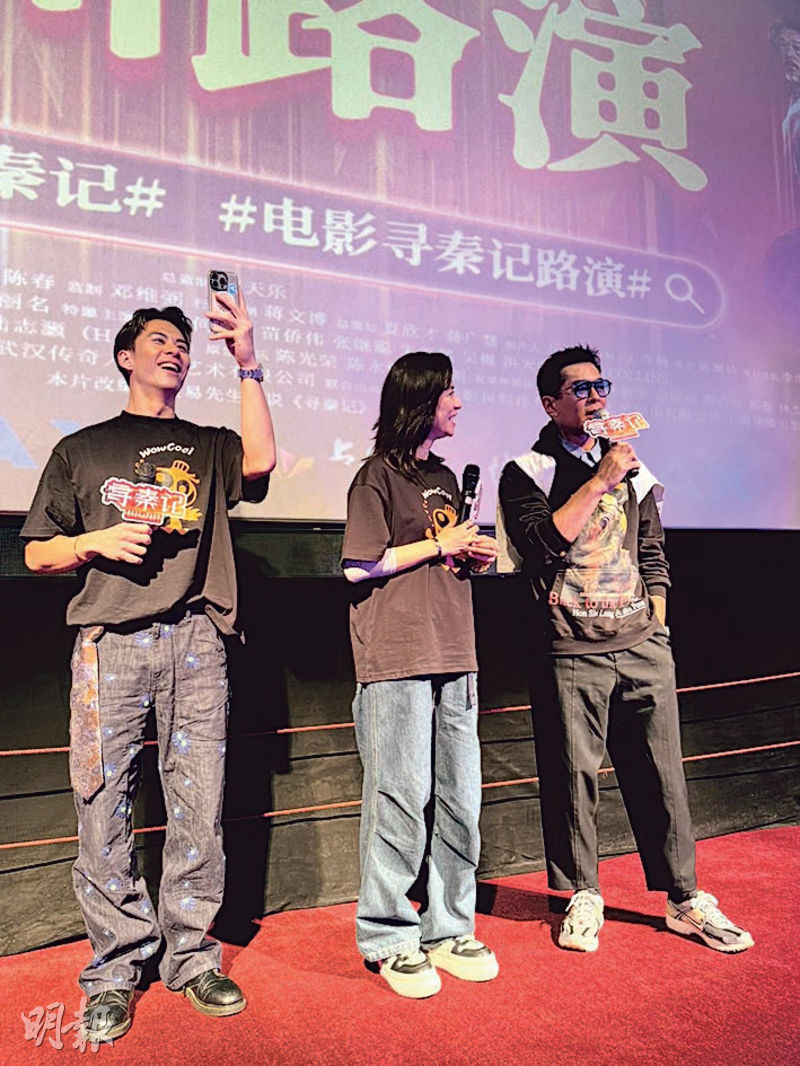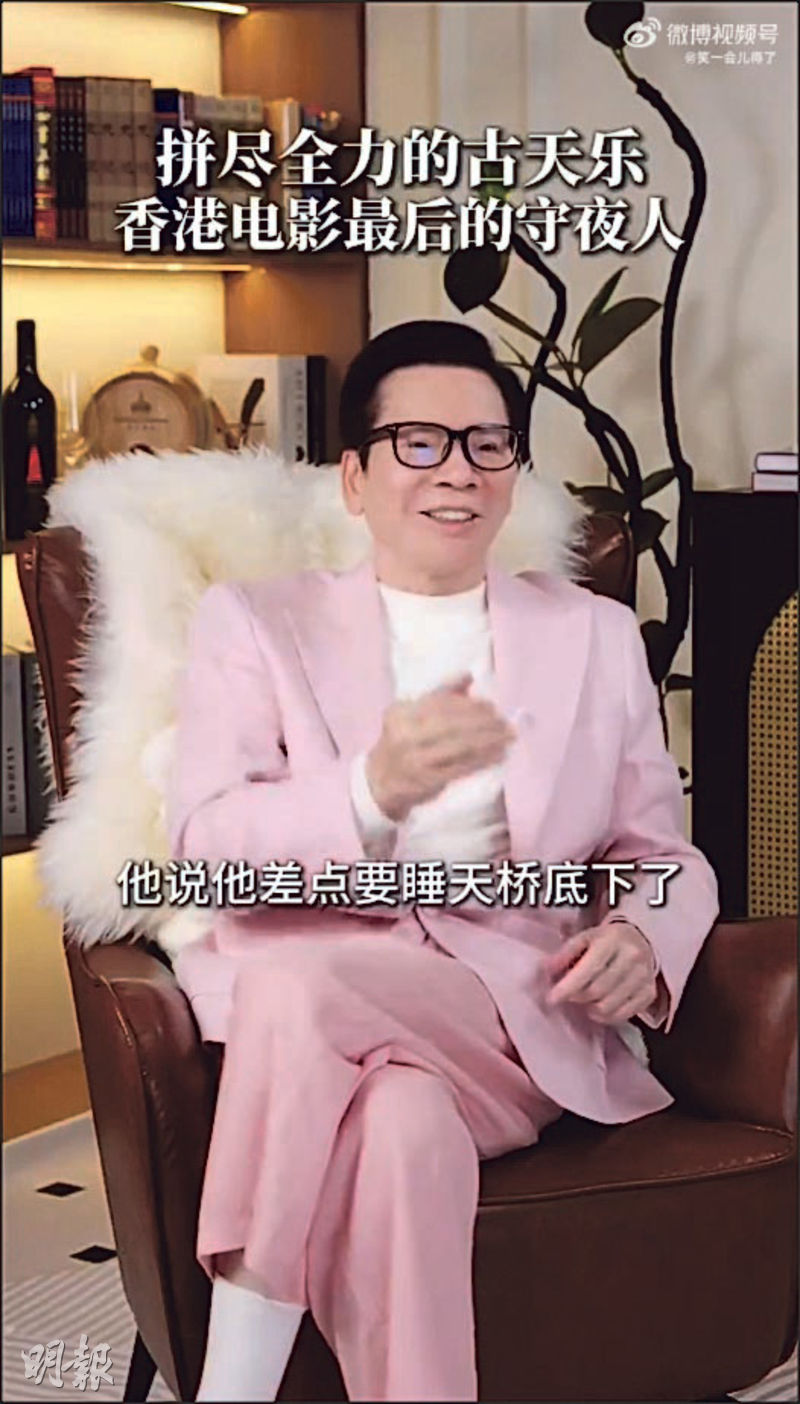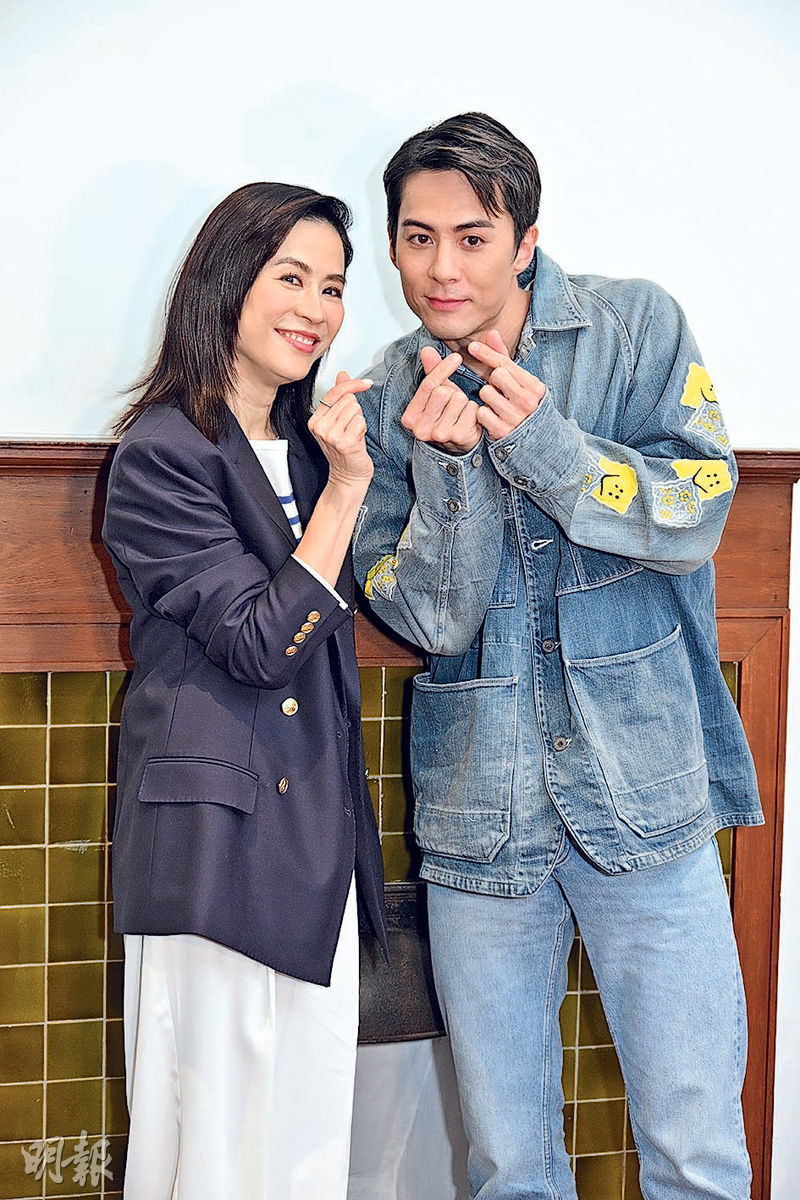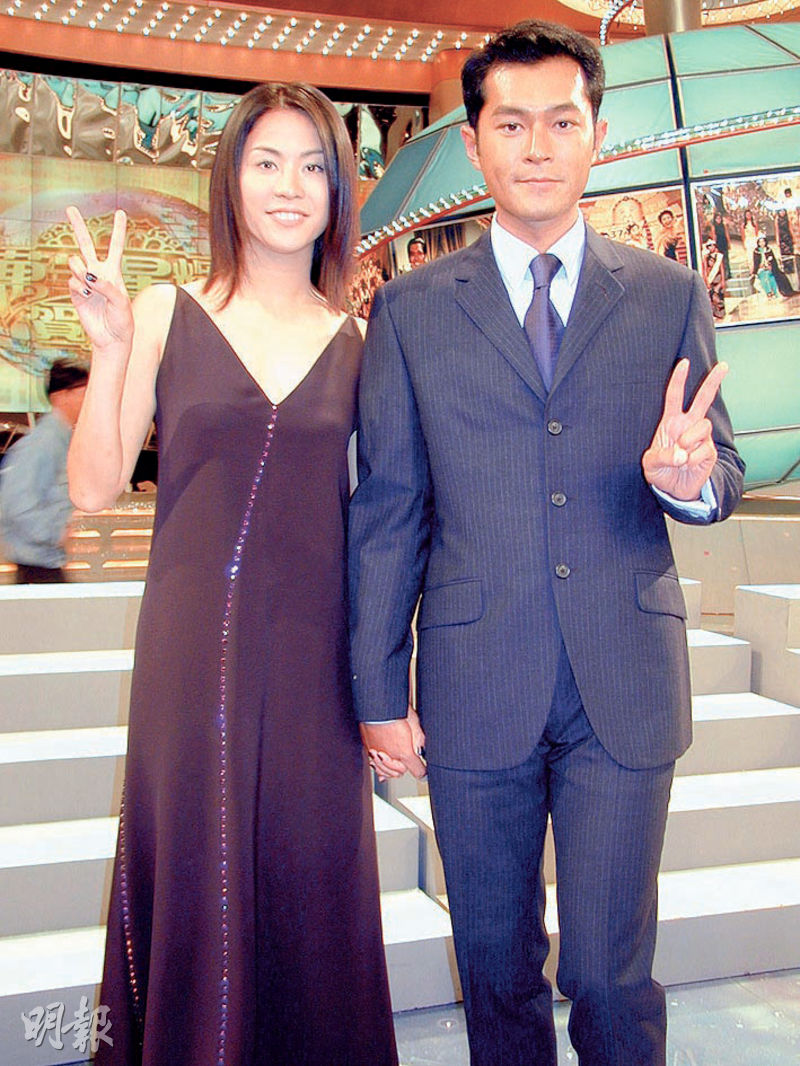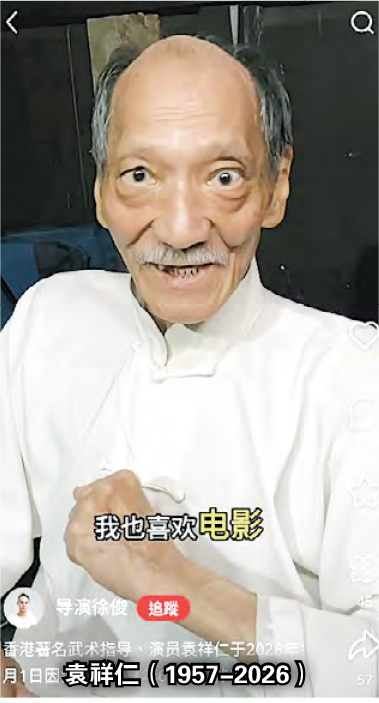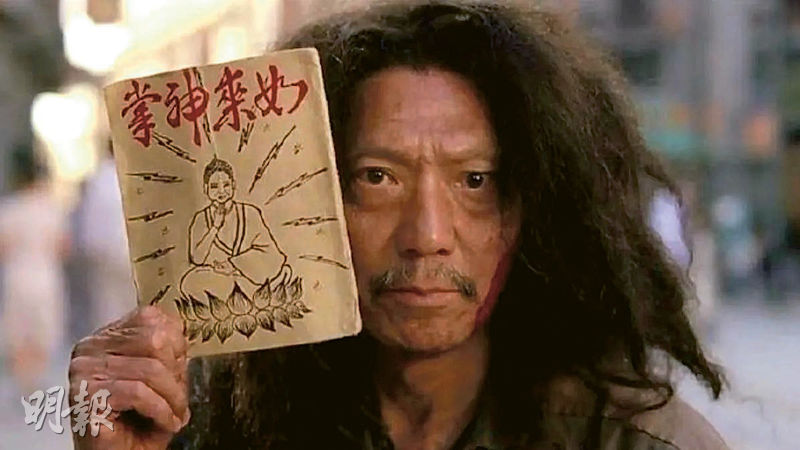 |
| Charmaine Sheh wins Best Actress again |
 |
| Bosco Wong becomes the double Best Actor and shows off the awards |
 |
| Eric Tsang receives the Honorary Legend award from his friend Alan Tam, and at the same time announces his resignation from the general manager post |
 |
| Him Law receives a card from his children, but still does not win the award |
 |
| THE QUEEN OF NEWS 2 sweeps up 9 awards to become the big winner |
 |
| Venus Wong fends off strong competition and wins Best Supporting Actress |
 |
| Matthew Ho has to settle down his emotions before being able to deliver his thank you speech |
 |
| James Ng gets so emotional when accepting the award that he is in tears. |
 |
| Sophia Yip does not forget to thank her boyfriend during her award acceptance |
 |
| Selena Lee and Bowie Lam walk the red carpet. |
 |
| Bob Lam "dissects" the award and Wong Cho Nam tries to help |
 |
| Toby Chan |
 |
| Stephanie Che gets emotional when she accepts her award. |
 |
| Samantha Ko makes an elegant turn and shows off her back |
 |
| Yoyo Chan wows the crowd with her super sexy appearance |
 |
Kelly Cheung looks beautiful on the red carpet.
courtesy of on.cc |
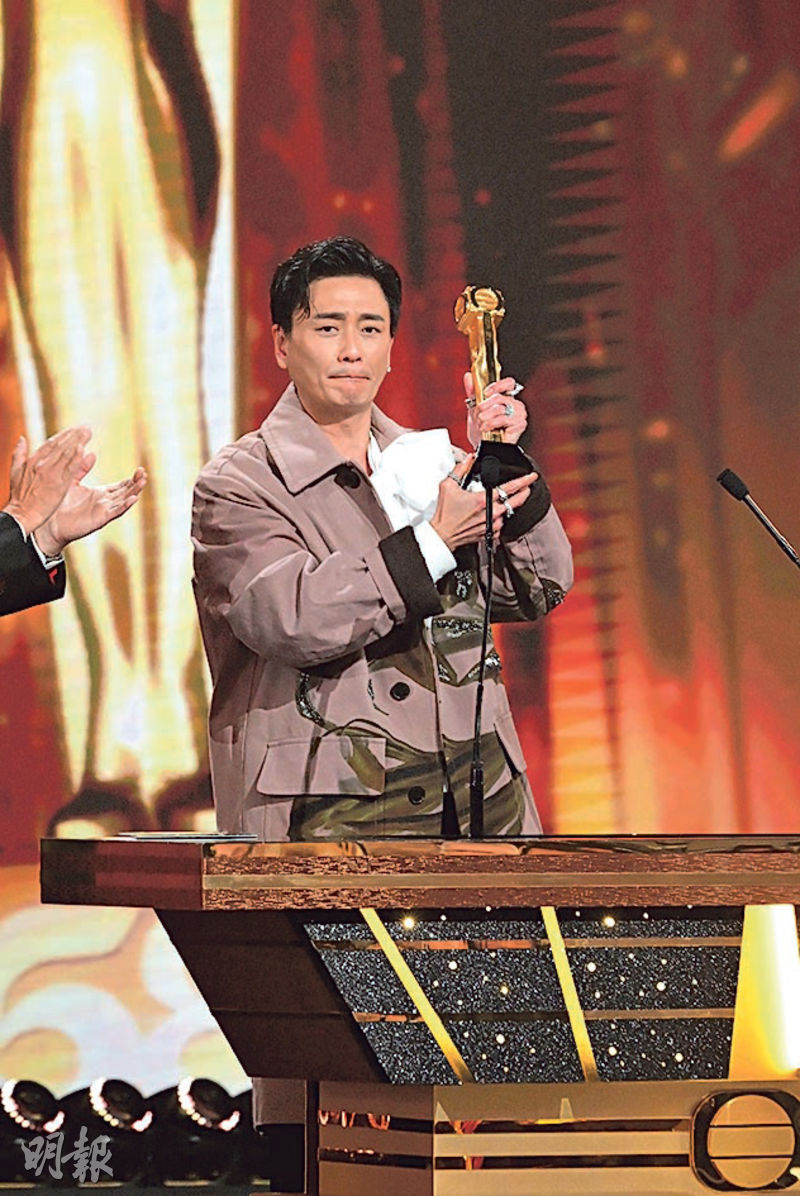 |
| Bosco Wong wins first Best Actor award and breaks down. |
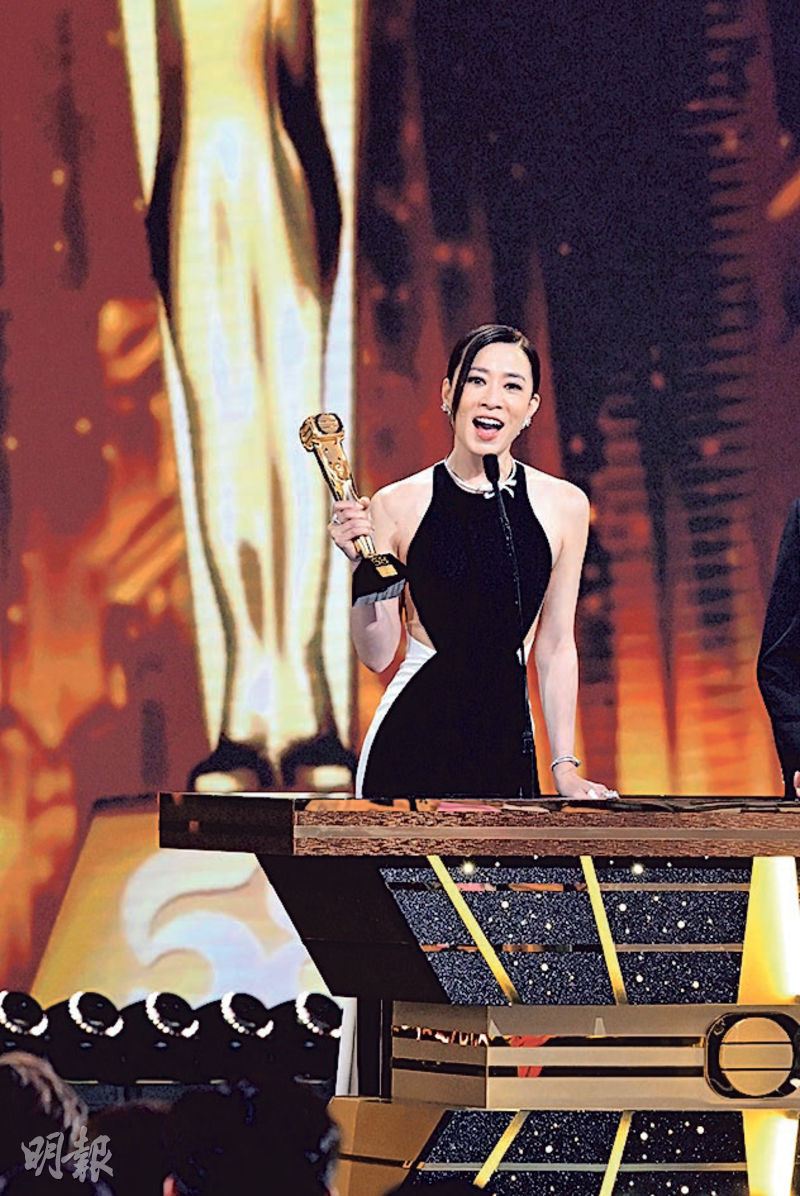 |
| Charmaine Sheh sets a 4 time Best Actress record, winning two Best Actress awards with THE QUEEN OF NEWS series |
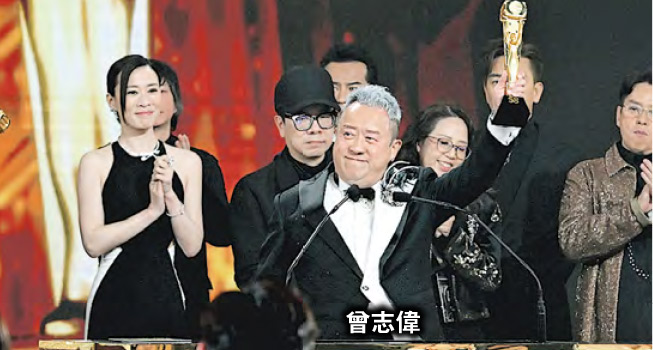 |
| Eric Tsang is about to leave his general manager post and receives the Honorary Legend award from TVB for his contributions |
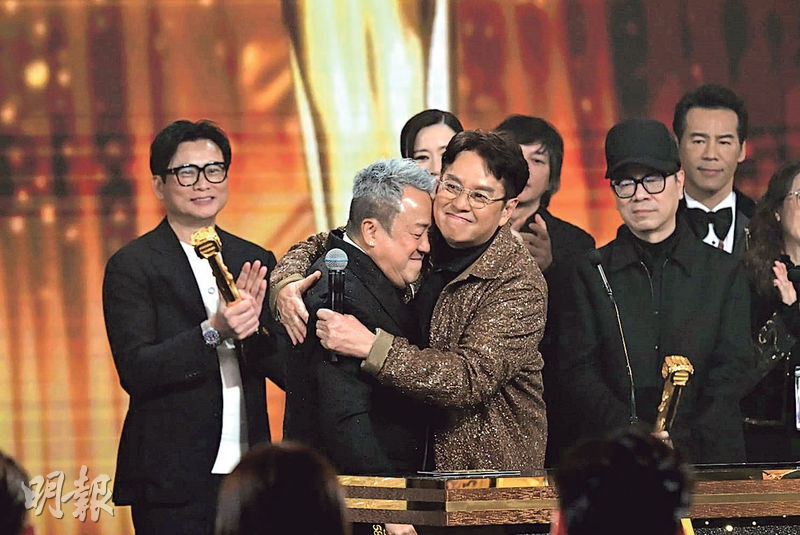 |
| Alan Tam serenades Eric Tsang before presenting the award. Eric Tsang then bows to and hugs his friend |
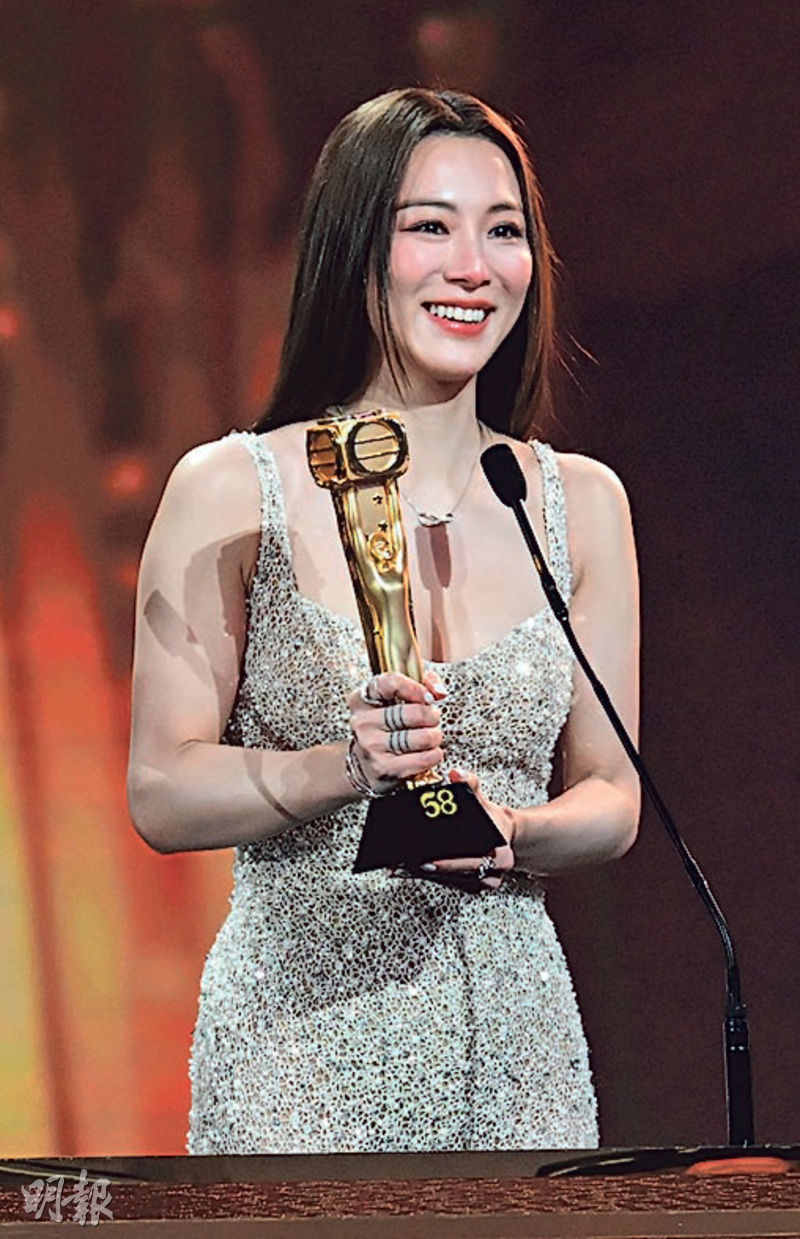 |
| Best Supporting Actress Venus Wong publicly thanks her father-in-law Eric Tsang in her speech |
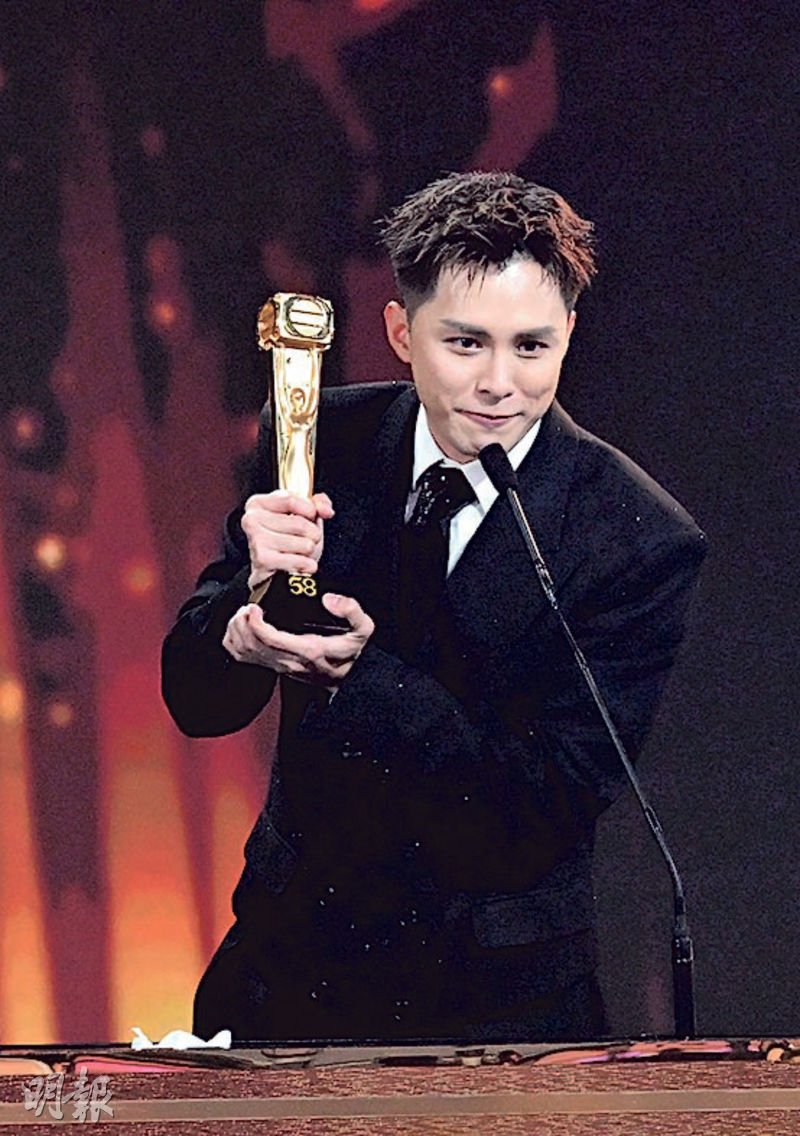 |
| Groom to be Matthew Ho holds the Best Supporting Actor award and says that this year would be the happiest year. |
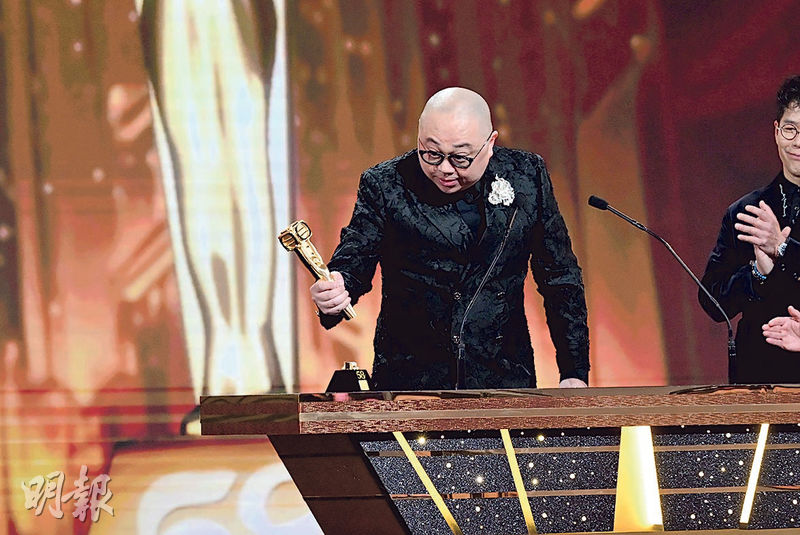 |
| Bob Lam wins Best Male Host and excitedly breaks the award, as panic is written all over his face |
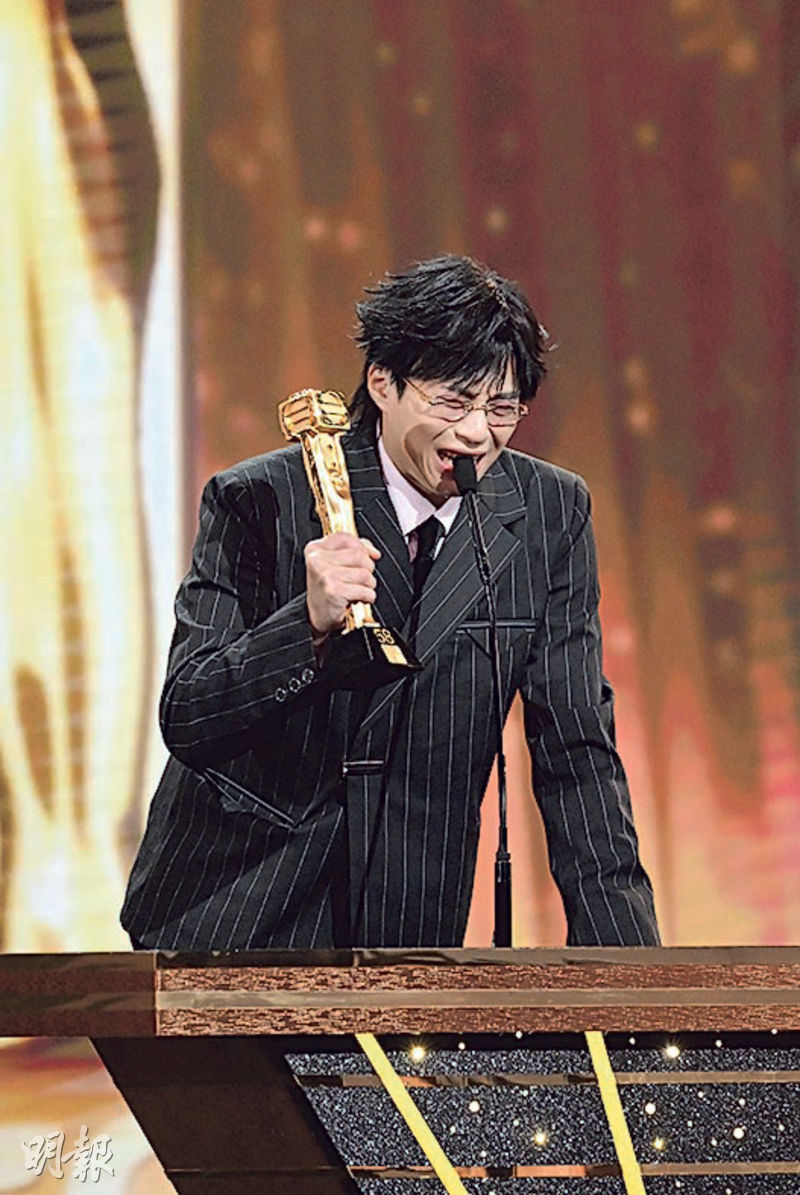 |
| James Ng wins "Leaping Male" and is so emotional that his face is all twisted |
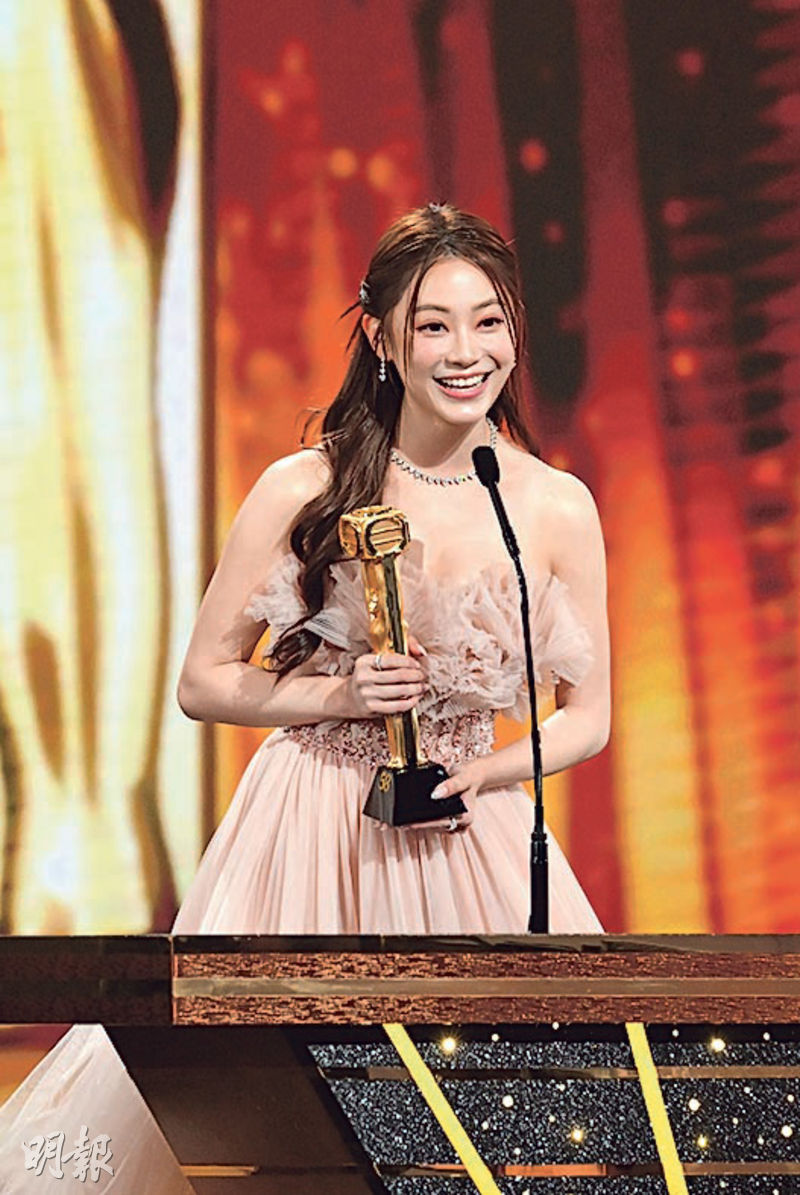 |
| "Leaping Female" Sophie Yip thanks her boyfriend's Mama for constantly making soup for her |
 |
| Hera Chan and rumored boyfriend Brian Chu win Best Dressed |
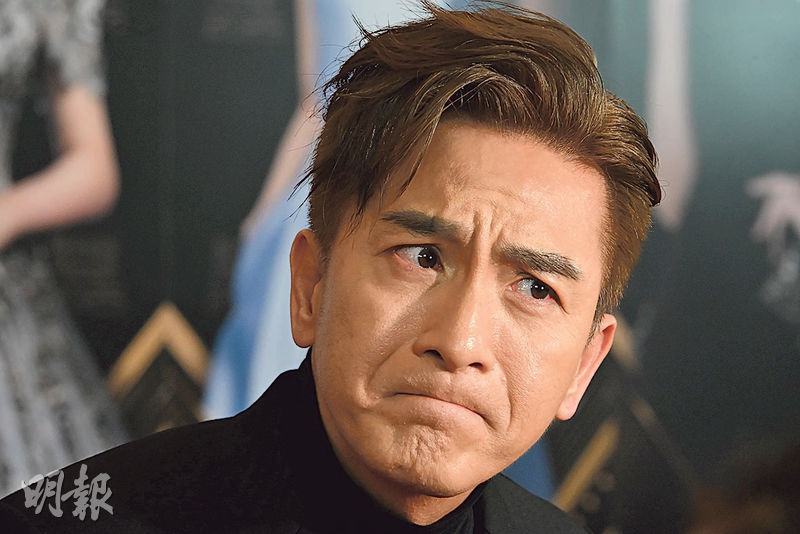 |
| Kenneth Ma succumbs to tears when he mentions his late father on the red carpet. |
 |
| Yoyo Chan and Kelly Cheung |
 |
| Roxanne Ho has a wardrobe malfunction as the edge of her base layer appears |
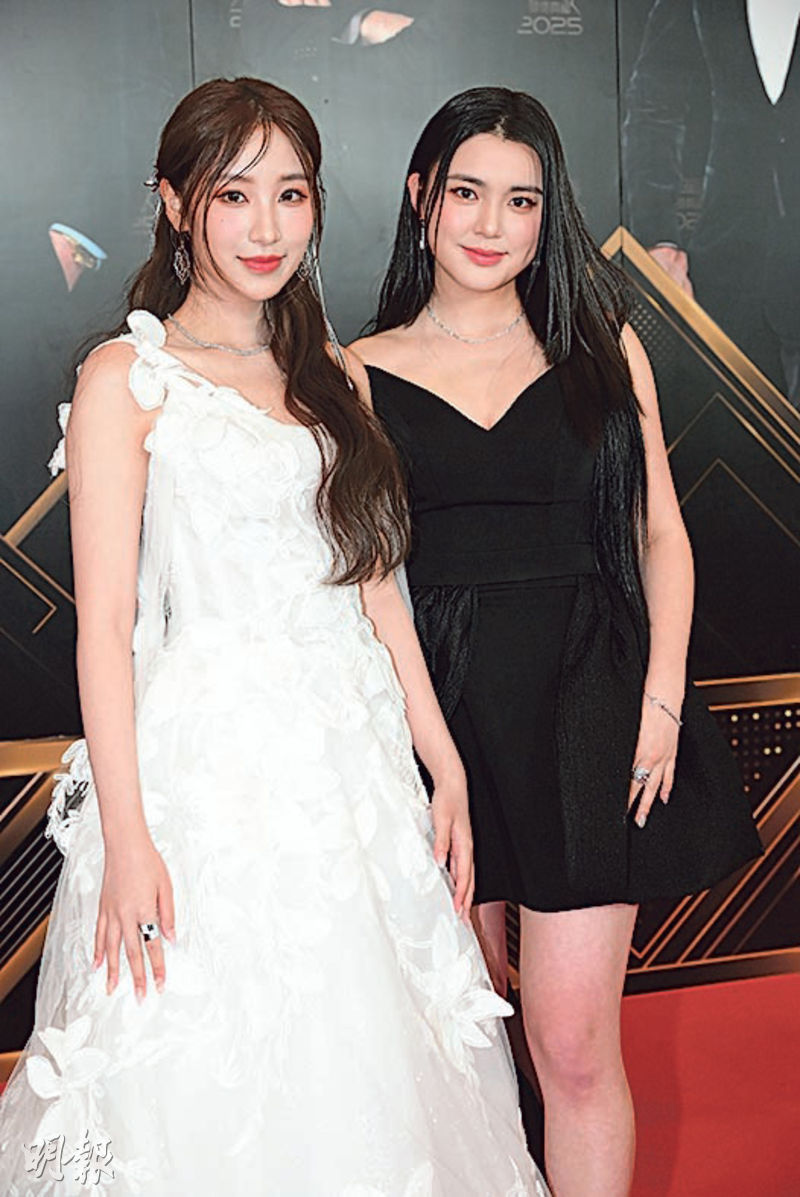 |
Windy Zhan and Chantel Yiu walk the red carpet together
courtesy of mingpao.com |
Kong Wenwei News (Reporter Dali, Liang Jingyi Macau Report)
TVB's annual event TVB Award Presentations 2025" was held last
night at the Grand Lisboa Palace Resort in Macau. The most watched
award race of the night "Best Actress" belonged to Charmaine Sheh Sze
Man of "THE QUEEN OF NEWS 2" and Jessica Hester Hsuan (Suen Huen) of
"THE QUEEN OF TOWER", but the latter announced in advance that she would
not attend the awards ceremony in Macau, so that there was no suspense
in the race between the queen. Finally Sheh Sze Man also naturally
received her fourth Best Actress award; "Best Actor" was won by Bosco
Wong Chung Chak for the first time with "THE QUEEN OF NEWS 2". "THE
QUEEN OF NEWS 2" won 9 awards and became a big winner. TVB thanked
Tsang Chi Wai for his outstanding contributions last night, awarded him
the "TVB Honorary Legend Award", and announced his appointment as the
convener of the newly established advisory committee to continue to
promote program innovation and strategic alliance.
TVB's general manager (Programm Content Operation) Tsang Chi
Wai has been frequently rumored to be leaving the post recently. Last
night TVB finally announced that Tsang Chi Wai will be transferred from
the current position of general manager (program content operation) to
the newly established advisory committee convener responsible for
advising the board of directors on new program content and strategic
direction starting on January 21st, 2026. Tsang Chi Wai with his ample
industry experience and unique observation of content creations provide
strategic suggestions on new technology use and cross platform strategic
alliance, and continue to promote TVB content ecology development.
The TVB Awards Presentations 2025" last night presented the "TVB
Honorary Legends Award" to Tsang Chi Wai as its finale, and his friend
Alan Tam Wing Lun presented him with the award. Tsang Chi Wai said,
"Thank you to the company for presenting this award to me. The most
special about the award is the word 'strange'. Strangely 5 years ago
I agreed to come in and sit in this spot. Many friends around me
described television as a sunset industry, if you don't do it you
wouldn't lose. Yet I wanted to share my over 50 years of experience
with colleagues. TVB has many viewers, shouldering the social
responsibility of entertaining everyone. In the past 5 years it has
made different variety of programs to bring everyone positive energy.
This is the goal of my return, today I feel I am a little out of gas. I
feel the need to resign and hand it to the younger generation to keep
going and take TVB to greater heights! I am stepping back temporarily.
Thank you to colleagues and Hong Kong viewers who has fought shoulder to
shoulder with me for the past 5 years." TVB also issued a notice at the
same about Tsang Chi Wai's transition to his new post starting January
21st.
Sheh Sze Man won the Best Actress again with the role of "Man
Wai Sum" in "THE QUEEN OF NEWS 2", breaking her own record and getting
on the throne for the fourth time. Sheh Sze Man could not hide her
excitement when she received the trophy on stage from Frankie Lam Man
Lung and his wife Kenix Kwok Ho Ying. Her eyes were filled with tears
as she said, "Tonight would be the most memorable night of my life.
Thank you everyone for appearing in such a beautiful image. Last
time I won I felt like I won, but this time Sister Man won. I have
become this character, carrying the exciting plot for the audience to
relate to. I want to tell Sister Man, 'I really love you, Man Wai
Sum!'". She was also grateful to her mother for being strong and
optimistic in facing her current situation, and thanked her brother for
taking care of her mother while allowing her to pursue her dreams
willfully. Finally, she concluded with philosophical words. "History
is created by human beings, so everyone in the audience can make history
again as long as they work hard. I am able to achieve that today, for
everyone in the audience as long as they don't give up, they too can be
the next one to make history. Producer Chung Shu Kai, I hope we can
make history again." Later Chung Shu Kai led THE QUEEN OF NEWS 2
production team to accept the "Best Drama" award.
When Wong Chung Chak received the "Best Actor" award, he cried
and said that he thought he would not be able to go on stage again after
winning the "Greater Bay Area Best Actor", so he could not thank TVB
Chairman Hui To. "Before when I spoke I was all messed up. Thank you
chairman Hui To for at such a difficult time for productions now to
provide so many resources to support the production." He said that he
has been lucky to have been taken care of by many seniors since his
debut. "As it turns out I would really cry!" Although he was a
"mischievous star", the teachings and the guidance of Elaine Lok Yi Ling
and Tsang Lai Chun have deeply affected him. He also thanked Chung Shu
Kai and Shaw's colleagues for their support, and finally thanked the
"Sam Soh" Jaime Chik Mei Chun for often making soup for him.
"Greater Bay Area Favorite TVB Actor and Actress" were also won
by THE QUEEN OF NEWS 2' Wong Chung Chak and Sheh Sze Man. Wong Chung
Chak first thanked Elaine Lok Yi Ling for treating him like a son for
many years, and also thanked TVB. "Actually the mind would really go
blank! Thank you TVB. TVB is where I grew up, and TVB raised me.
Without TVB, there would be no me Wong Chung Chak. Of course I have
to thank brothers and sisters in THE QUEEN OF NEWS 2 cast and crew.
Thank you to the SNK team, thank you to my Ma. If she hasn't spent
my money, I wouldn't have to keep working and I wouldn't run into
such a good script." Then he tossed out "Leave it for Ah Sheh to
speak" like a prophecy, guests Pakho Chau and Raymond Wong Ho Yin then
announced Ah Sheh as the "Greater Bay Area Best Actress".
Sheh Sze Man sincerely thanked the fans who supported "THE
QUEEN OF NEWS" for allowing her to reunite with the role of Sister
Man, and said, "Without you THE QUEEN OF NEWS 2 wouldn't be born, and
I wouldn't have the chance to reunite this lovable character of
Sister Man. I am very happy, I hope that Hong Kong dramas can
continue to be carried forward in different regions and places,
continue to spread the spirit of our Hong Kong dramas and win glory
for Hong Kong." "Greater Bay Area Favorite TVB Drama" also went to
THE QUEEN OF NEWS 2. The drama won 9 awards and became the big winner.
Last night's awards ceremony first announced the newcomer
awards, Carmen Ngai Ka Man won the "Best Female Newcomer", while Kevin
Liu Yang and Mason Fung Ho Yeung both won the "Best Male Newcomer".
Fung Ho Yeung was announced first. When Liu Yang's name was announced,
he needed those around him to remind him before he realized that he
won. He thanked TVB and screamed, "I love Hong Kong!"
Venus Wong Man Yik defeated the popular Mimi Kung Chi Yan with
"THE QUEEN OF NEWS 2" to win the "Best Supporting Actress". Eddie
Cheung Siu Fai and Pat Ha Man Jik presented the award to her. When the
award was announced she was stunned, then she hug Kung Chi Yan and Sheh
Sze Man as she headed toward the stage. Winning the award for the first
time she cried tears of joy as she kept telling herself to stay calm on
the stage. She thanked every audience who voted for her, the company's
senior executives, and did not forget to thank her father-in-law in the
audience, Tsang Chi Wai. She said, "It turns out that I would really
draw a blank, I am very honored to nominate with Sister Kung and all the
nominees. Actually in the past few years in the company, what I have
learned is that I must be very humble and keep working hard. Because
being an actor is not a competition, this award is not our ultimate
goal, and it is a great honor for every work and role we have to be
remembered. Thank you so much, thank you all! An actor doesn't need to
rely on an award to tell others how good he is, but an award can
definitely make an actor walk with more persistence." When interviewed
backstage, she was asked if she was still a blank? She said, "Yes!
Actually you really can't prepare for it. You would have stage fright.
(You didn't thank your husband Tsang Kwok Cheung?) I thanked whoever I
saw, thank you Director Tsang (husband Derek Tsang Kwok Cheung). He is
watching television and latter would come over."
In the industry for 16 years and nominated for the "Leaping
Improvement Male Artist" 6 times, James Ng Yip Kwan finally won the
award this year. Appearing to be very emotional, his tears and his nose
were both running all at once. When Ng Yip Kwan won the Best Rookie
Award at the 2015 Jade Solid Gold Awards, his fogged up glasses from his
crying has become a classic scene. This time they did not fog up. He
thanked his family and TVB executives. He emotionally said that from
THE VOICE 2, this show business ride has been full of twists and turns
over 16 years. He also encouraged everyone that the racetrack of life
has no end. "Some people won at the starting line, some play pawns,
thugs, life has no end. As long as you strive and keep walking, you
will definitely see the scenery you want to see. 15 years ago Ng Yip
Kwan gave people a very subpar impression. I hope that 15 years later
when they hear this name it its professional and serious." Ng Yip Kwan
said after winning the award, "Spending over a decade to win this award,
I am very touched. I understand that I need to spend time to absorb.
When I win I have good memories, from the singing contest THE VOICE to
now. (You were very nervous before the award announcement.) YEs, I
had to grind my teeth to be able to relax. When I found out I won I was
very ugly, but I wanted everyone to know that I have put in a lot of
effort and hard work. However for this award, my glasses didn't fog
up."
The "Leaping Improvement Female Artist" went to Sophie Yip Sin
Man, who has been in the industry for 10 years and has risen in
popularity last year with the romance variety show "A DATE WITH
GODDESS". She thanked the LO AND BEHOLD team, from her first
episode she worked for 8 to 9 years. Accompanying viewers on television
as they had dinner, she felt being an artist was very interesting. "A
DATE WITH GODDESS" was even the great harvest, as she publicly thanked
boyfriend GM Randal Tsang Gin Mong and her future mother-in-law for her
soups. She said in her interview that after 10 years in the business,
she faced the award with a normal state of mind. Instead when A DATE
WITH GODDESS won she was moved to tears. Was GM not winning the
"Leaping Male" the imperfection? She said, "Yes, it is. When I heard
it wasn't him, my eyes got a little red. I was even more upset than
when I won. (How would you comfort GM?) Let's see what he would
need? I would agree to anything he asks."
Waiting for the "Best Male Host" award for many years, Bob Lam
Sing Bun finally got what he wanted. "I got a squeeze from Mayanne
(Mak Mei Yan) and I forgot everything. (Toby) Chan Ting Yan doesn't
have to worry, I will definitely help you find a boyfriend. In 2026 I
won't work on anything else, only you." Then Bob returned to being
serious and thanked the voters, TVB executives, his company partners
and of course his family. He also mentioned that his children were
already used to Papa losing, but this time he finally was able to win.
He hoped that he could make his family feel proud! He recalled that
when he first got on television, he faced a lot of negative comments
online and felt upset. Finally he pointed out that show business
journey isn't easy, he would continue to work hard to be the best
host. He was so excited that when he raised the award high and put it
down hard, he accidentally broke the trophy on the podium and caused
it to split in two. He immediately looked panicked as the entire
audience cracked up. One of the award presenters Wong Cho Nam "made
the save", tried to help Bob "fix" the award but to no avail. Bob
could only carried the award off stage as Wong Cho Nam smiled at Bob
and said, "No matter how well you spoke it's useless. This move is
the most powerful, great." Jerry Lamb Hiu Fung added, "As a host we
can only wipe the table a little." Wong Cho Nam resumed, "You really
won. Since the launch of TVB, you are probably the first to break
the award! Hit the ground and blossom!" When interviewed Bob said,
"I am probably the first artist in history to immediately 'smash' the
award after winning it, but this is a prop. Later I would have a real
award. I would lock it in a secured box." He also revealed that he
helped Chan Ting Yan match with another half who would be worth at
least 2 billion.
The "Best Female Host" went to Stephanie Che Yuen Yuen, who has
been in the industry for 33 years. She cried with joy on stage and
thanked the musicians and program producers she have worked with before.
"Best Supporting Actor" went to THE QUEEN OF NEWS 2's Matthew Ho
Kwong Pui. When he learned that he won, he immediately lowered his head
at the table and began to sob. When he raised his head he was still
very emotional. On the stage he was unable to speak and needed to
settle his emotions before he was able to continue. "I remember the
last time I was on here to accept an award, it was already 2018's
Leaping Improvement Award. I told myself that if I would come up again
I should use a very long time and spend even greater effort to be able
to win. It is not easy at all." Later he thanked the TVB executives
and producer Chung Shu Kai, and of course his good partner in the drama
Sheh Sze Man. Finally he thanked his family and other half. "I would
keep working hard, 2026 is a happy year. Thank you everyone."
Eric Tsang Chi Wai returned to TVB in 2021, first as deputy
general manager and then promoted to general manager. During his tenure
he promoted a number of reforms and injected new impetus into TVB.
Tsang Chi Wai returned to TVB in early 2021 as the deputy
general manager (variety, music production and programming) and
administrative committee special consultant. His first task after
returning to the nest was to resolve the copyright dispute between TVB
and the "Big Four Record Labels" since 2009 and finally facilitated the
"Great Reconciliation of the Century", allowing singers from Universal,
Warner, Sony and EMI to return to the TVB stage. In September of the
same year, he was promoted to general manager (program content
operation), fully responsible for the production and planning of variety
shows, drama co-productions and music.
In terms of programs, he restarted the classic variety show
"SUPER TRIO" series to evoke collective memories of the audience. He also
produced talent shows such as STAR ACADEMY and MIDLIFE SING AND SHINE!,
which successfully made popular singers such as Gigi Yim Ming Hay, Chantel
Yiu Cheuk Fei, Albert Chau Kat Pui, and Vic Teo (Cheung Yu Sun). At the
same time he promoted the collaboration with Hunan Satellite TV INFINITY
AND BEYOND ENDLESS MELODY, which attracted a large number of mainland
audiences with the subject of Hong Kong music and opened up a broader
platform for TVB.
In November last year, Tsang Chi Wai was rumored to announce his
resignation at TVB Anniversary Show. Although he denied it on the spot,
he also admitted that "one day he would leave".
In addition to the fierce competition for major awards, the red
carpet session before the awards ceremony was also regarded as a prelude
to the awards ceremony. A group of male and female artists dressed up
carefully to compete for the "Best Dressed Male and Female Artist Award".
Female artists have their own clever ideas on the sexiness
scale. Kelly Cheung Hei Man stood out as the sexiest female artist at
the venue. When she and Moses Chan Ho were interviewed, she said that
because she was busy filming dramas, she had no time to choose what to
wear and let the image designer to decide. She jokingly hoped that her
grandma who loved to "rate" how artists were dressed would "show mercy".
"The designer gave me this dress at the last minute and it was the only
one, so I don't have a choice. Otherwise I wouldn't have anything to
wear. I worry about scaring Grandma the most. Because she is a loyal
TVB fan, she is always asking why do the girls dress like this!" Chan
Ho was asked if he would "dare not look directly"? He praised Cheung
Hei Man for having an outstanding figure like a model, which inevitably
made people look at her twice.
However Kenneth Ma Kwok Ming, who lost his father not long ago,
revealed that he was in an okay mood. He was glad that he has just
finished filming a series at that time and was able to concentrate on
housework, but due to many tedious things they have not been completely
done. Known for being a filial son in the business, he said that he
would try to spend as much time as possible with his mother in the
future; Later when he mentioned his deceased father, he could not help
but wipe his tears with a tissue. Walking with him, Samantha Ko Hoi
Ning showed her back and said that she chose clothes "according to the
mood" now. Her mood that night was towards the goal of "watching the
back (TV Best Actress)".
Venus Wong Man Yik won Best Dressed last year, so this year she
was at ease leaving what she would wear to the stylist. As for rumors
that her father-in-law Eric Tsang Chi Wai would leave his post as the
TVB general manager, would she feel sorry? Wong Man Yik said, "Over the
past few years he has established a good relationship network for the
company, been able to help many artists and colleagues and have a
positive influence on morale. Many colleagues have thanked him for
his hard work and contribution. As family I want him to be healthy,
leave more time for vacations and being with his family and friends.
However Father-in-law would decide and announce his life." She revealed
that her husband's family has planned a family trip, if she would not
have to work she would join them.
As the Roxanne Ho Pui Ga explained her wardrobe malfunction.
She did not have time a full fitting, and revealed that she would change
to something else as the host. Also attaching importance to "safety"
were Carmen Kwan Ka Man and Yoyo Chan Chi Yiu; Kwan Ka Man's see-through
outfit made her struggle to find a suitable base layer, but she was
confident that she has done enough "360-degree" measures. She joked
that "somersaults or running is no problem"; Chan Chi Yiu challenged the
sexy evening dress and admitted that she had a special breast
enhancement treatment for this purpose. "Sometimes I have to be
responsible as the spokesperson. For this dress, earlier I went for
more breast enhancement treatments." She needed to keep her body
straight and avoid big movements throughout the night.
Brian Chu Man Hon in order to win Best Dressed Male Artist
told the media that they could "feel all they want" to campaign for
votes. In the end his wish came true as he and rumored girlfriend Hera
Chan Hiu Wah won "as a couple". When interviewed together, Chu Man Ho
was asked how he felt about what Chan Hiu Wah was wearing. He praised
immediately, "Very pretty very pretty very pretty. (Is she too sexy?)
No, she is respecting the occasion." As for the rumored company "love
ban", they both agreed that they have not heard of it.
Bowie Lam Bo Yi and Selena Lee Sze Wah last night walked the red
carpet together. Nominated for "Best Actress" and "Greater Bay Area
Favorite TVB Actress", Sze Wah earlier did not campaign for votes.
Even at the venue she declined any media interview, seemingly to be in
a state of "forfeiting the race". When the host talked bout the scene
when her "THE QUEEN OF NEWS 2" character "Cheung Ka Yin" left the
television station, she burst into tears and left viewers heartbroken.
She said, "This scene is pretty memorable. I feel very lucky to have
the first season, in which I have a lot of memories and emotions.
Although it didn't have any dialogue and only music, it was very rich.
(Online comments hoped that next time would be so tragic.) It is still
a happy ending."
"Best Actor" and "Greater Bay Area Favorite TVB Actor" nominee
Bo Yi said, "Thank you TVB for giving me the opportunity to attend
again. (How confident are you about winning Best Actor?) If I don't
win either award I am done for, I won't be able to go home with any dignity."
The male and female protagonists of the drama "THE QUEEN OF NEWS
2" Wong Chak Chung and Sheh Sze Man made their grand finale entrance,
causing the audience to scream. Wong Chung Chak joked that he wanted to
complain that Sheh Sze Man did not campaign for votes for him. Sheh
Sze Man said, "Because you are my Best Actor pick"!
In addition, Chantel Yiu Cheuk Fei and Windy Zhan Tianwen talked
about Yumi Chung Yau Mei's private photo leak incident again and said
that they would give her space to meditate and adjust. Would they be
worried that the incident would affect Chung Yau Mei's image? Yiu Cheuk
Fei emphasized that she would not interfere with the privacy of others,
while she would let her romantic affairs take their natural courses.
The two even admitted that they also have a lot of "black pictures" and
"black history" in their mobile phones, and they would be more careful
when uploading photos in the future.
TVB AWARDS 2025
BEST SERIES: THE QUEEN OF NEWS 2
BEST ACTOR: Bosco Wong (THE QUEEN OF NEWS 2)
BEST ACTRESS: Charmaine Sheh (THE QUEEN OF NEWS 2)
BEST SUPPORTING ACTOR: Matthew Ho (THE QUEEN OF NEWS 2)
BEST SUPPORTING ACTRESS: Venus Wong (THE QUEEN OF NEWS 2)
GREATER BAY AREA FAVORITE TVB VARIETY AND INFORMATIONAL PROGRAM: A DATE WITH GODDESS
GREATER BAY AREA FAVORITE TVB ACTOR: Bosco Wong (THE QUEEN OF NEWS 2)
GREATER BAY AREA FAVORITE TVB ACTRESS: Charmaine Sheh (THE QUEEN OF NEWS 2)
GREATER BAY AREA FAVORITE TVB SERIES: THE QUEEN OF NEWS 2
PROFESSIONAL SPIRIT AWARD: Cheung Chai Yan
TVB ANNNIVERSARY HONORARY LEGEND: Eric Tsang
BEST VARIETY PROGRAM: MIDLIFE SING AND SHINE! 3
BEST INFORMATIONAL AND SPECIAL TOPIC PROGRAM: SCOOP
BEST MALE HOST: Bob Lam Sing Bun
BEST FEMALE HOST: Stephanie Che
LEAPING IMPROVEMENT MALE ARTIST: James Ng
LEAPING IMPROVEMENT FEMALE ARTIST: Sophie Yip
BEST TELEVISION SONG : SEED OF TRUTH (THE QUEEN OF NEWS 2) (Windy Zhan)
BEST MALE NEW COMERS: Mason Fung, Kevin Liu
BEST FEMALE NEW COMERS: Carmen Ngai
BEST DRESSED MALE ARTIST: Brian Chu
BEST DRESSED FEMALE ARTIST: Hera Chan




















